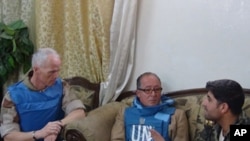The U.N. mission in Syria is a small contingent trying to monitor a very large conflict. Violence continues in Homs, Hama, Damascus and elsewhere despite a cease-fire agreed to by the government and the opposition last month. (Hear the full interview here.)
It's been termed by some an impossible mission, but U.N. mission leader General Robert Mood says his team has already seen "very specific, concrete steps on the ground."
"We see that we have a calming effect on the situation," said Mood. "So we have seen in these places a significant reduction in shelling. We have seen a significant reduction in shooting."
In the week since the mission got underway, both sides, he says, have pulled back from positions on monitors' advice. But with just a few dozen unarmed observers to implement the U.N.-brokered peace plan, Mood is aware the situation can quickly regress.
"We are working on a specific plan where you can go back to the specific site where you had an engagement, where you gave advice and to verify that the advice, when it was taken, is respected also 12 hours or 24 hours or two days later," Mood added.
The Norwegian general is trying to monitor the end of hostilities even as more weapons are being added to the mix. The opposition in exile argues that the military wing of the uprising needs more firepower to counter a government supply still fed by Russia. Mood acknowledges there is fragmentation.
"But what I can tell you from my engagement is that whomever I meet, they tell me that they want to move on the basis of [U.N.-Arab League envoy] Kofi Annan's Six Point Plan, and that includes the Free Syrian Army locally, and that includes Local Coordination Committees. I am fully aware that there are others with a different agenda, that have other ideas, but I have yet to see a credible alternative to Kofi Annan's Six Point Plan. So one way to put it is that it's, for now, the only game in town," Mood explained.
But there's a wild card recently thrown into that game, the emergence of jihadist groups such as Jabhat al-Nusra, claiming responsibility for various attacks. The Syrian government has long blamed foreign terrorists for what started as a popular uprising. Mood says he cannot confirm such groups are on the ground, but has heard reports of foreign militants from various sources. The threat, he says, provides for a rare moment of common ground between the government and its opponents.
"I've also received the message from almost the same players across the spectrum that they don't want to see the future of Syria - a very proud, warm, hospitable people - being dictated by groups from the outside having different agendas," Mood said.
While the chasm between a decades-long autocratic government and an increasingly militarized opposition remains huge, Mood, who served in a previous U.N. mission in the region, sees reason for hope.
"I get a sense that all the players are eager to see this move forward on the basis of political solutions because they see that the alternative - more violence, more kids being killed, more trouble for families in these hot spots - is a very bad alternative," Mood noted.
But he prefaces the statement by saying the willingness should not be overestimated. It is, he says, "too early to judge."
| Join the conversation on our social journalism site - Middle East Voices. Follow our Middle East reports on Twitter and discuss them on our Facebook page. |




